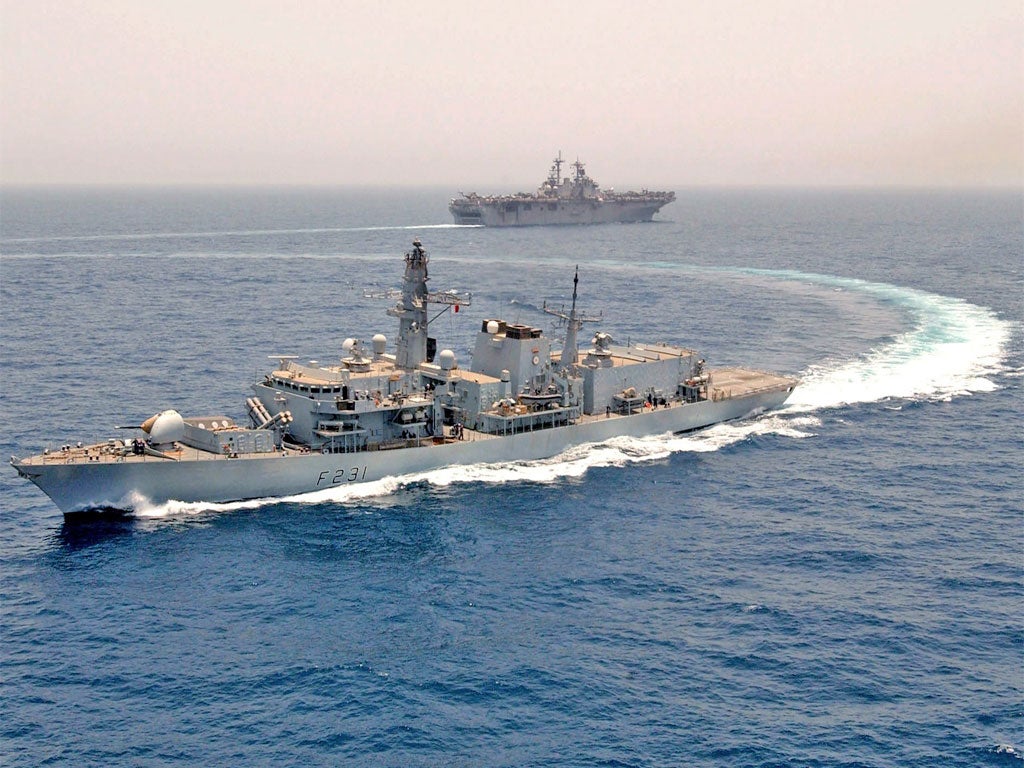West strikes first at Iran with EU oil sanctions as warships gather
Combined show of strength aimed at bringing Tehran back to the negotiating table over nuclear concerns

Sanctions designed to bring Iran to the negotiating table over its nuclear programme by choking off its economic lifeblood – oil – were imposed by the European Union yesterday alongside a Western display of naval power as a warning to the Tehran regime against seeking military retaliation.
The punitive measures were, as expected, aimed at severely damaging the country's oil exports, with a ban on import by EU countries. Restrictions would also be brought against key financial institutions, including Iran's central bank, in a move to tighten further the commercial noose.
The EU's announcement, described by President Mahmoud Ahmadinejad as " the heaviest economic onslaught on a nation in history", came within hours of an American, British and French flotilla sailing through the Strait of Hormuz, a vital channel for oil shipments that Tehran had threatened to blockade if the sanctions were imposed.
The aircraft carrier USS Abraham Lincoln, escorted by an American guided-missile cruiser and two destroyers, HMS Albion and a French warship, La Motte-Picquet, passed a few miles off the Iranian coast to emphasise that the strait remains an international waterway and attempts to shut it down will not be tolerated, Western officials said.
Iran's Islamic Revolutionary Guards Corps had pledged that "not even one drop of oil" would be allowed through Hormuz if the US and Western Europe "carried out the blatant aggression of sanctions". There were no immediate signs of activity by the country's armed forces yesterday in the area, but Mohammed Kossari, the deputy head of parliament's national security committee, with close links to the regime, said: "If America seeks adventures after the closure of the Strait of Hormuz, Iran will make the world unsafe for Americans in the shortest possible time."
Israel, which has repeatedly warned that it may carry out air strikes if Iran continued to seek the bomb, welcomed the set of embargoes but said it remained sceptical about whether the matter could be solved without military action. Prime Minister Benjamin Netanyahu said "these are steps in the right direction" but stressed that the " development of nuclear weapons continues".
The Russian Foreign Minister Sergei Lavrov said the sanctions would be counter-productive and called for the resumption of talks between Iran and the international community.
Foreign Secretary William Hague said: "It is absolutely right to do this when Iran is continuing to breach UN resolutions and refusing to come to meaningful negotiations on its nuclear programme. These are peaceful and legitimate measures, they are not about conflict."
The International Atomic Energy Agency, which in a critical report last November concluded that Iran has carried out tests "relevant to the development of a nuclear explosive device", will be sending a team to Tehran at the end of the month "to resolve all outstanding substantive issues".
But officials acknowledged there was no sign inspectors would be allowed access to the most sensitive sites, such as one near Qom, where, it is claimed, work towards weaponisation is being carried out. The immediate issue for the West is just how effective the sanctions turn out to be. The oil ban affects all new contracts, while existing ones will be honoured until 1 July.
The EU buys about 25 per cent of Iranian oil, but the biggest customers are countries hit the hardest by the eurozone crisis: Greece, Spain and Italy. Other Northern Europe members have said they will help these countries secure alternative supplies from sources such as Saudi Arabia.
Subscribe to Independent Premium to bookmark this article
Want to bookmark your favourite articles and stories to read or reference later? Start your Independent Premium subscription today.

Join our commenting forum
Join thought-provoking conversations, follow other Independent readers and see their replies